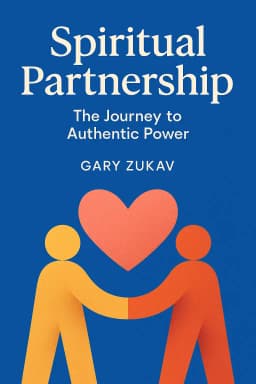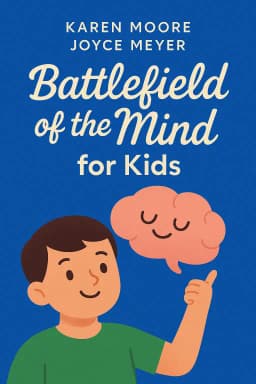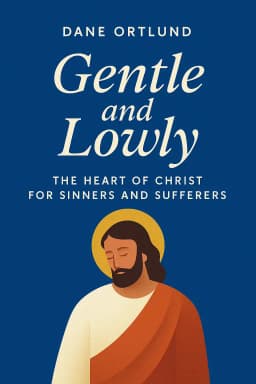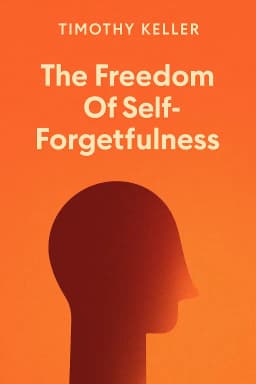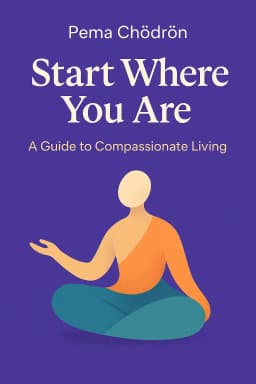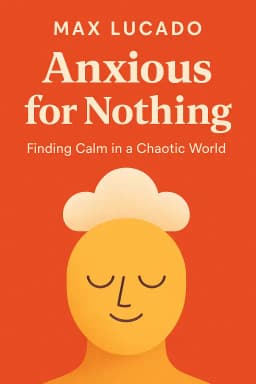
The Anxiety Paradox
Golden Hook & Introduction
SECTION
Daniel: The biggest lie we tell ourselves about anxiety is that we need to get more control over our lives to fix it. Today, we’re exploring a wildly popular book that argues the exact opposite: the only way to find calm is to give up control completely. Sophia: That's a bold claim. Which book is this? Daniel: It's Anxious for Nothing by Max Lucado. And what's fascinating is that Lucado isn't a psychologist; he's a long-time pastor, someone Christianity Today once called 'America's Pastor.' He wrote this after decades of seeing people wrestle with this, and he's sold over 150 million books, so his perspective clearly resonates with a massive audience. Sophia: Okay, so we're talking about a spiritual approach to a psychological problem. I'm intrigued and a little skeptical. Let's get into it.
The Sovereignty Solution: Why Relinquishing Control is the First Step to Calm
SECTION
Daniel: Your skepticism is exactly the right place to start, because this first idea feels completely backward. Lucado's prescription for anxiety begins not with breathing exercises or mindfulness apps, but with a call to rejoice in God's sovereignty. Sophia: Hold on. 'Sovereignty.' For someone who didn't grow up in the church, what does that actually mean in this context? Is it just a fancy word for 'fate'? Daniel: That's a great question. It's less about a predetermined, impersonal fate and more about trusting that a benevolent and competent CEO is running the universe. Lucado illustrates this with a fascinating historical study from World War II. Psychologists looked at two groups of soldiers: ground troops and fighter pilots. The ground troops were in a state of constant, low-grade dread. They never knew when a shell might land or an attack might come. They felt utterly helpless. Sophia: I can imagine. That sounds like the definition of anxiety. Daniel: Exactly. But the fighter pilots, despite having a much higher mortality rate, were often described as happy, even joyful. The researchers concluded the difference was perceived control. The pilot, holding the joystick, felt he had some agency in his destiny. The infantryman felt he had none. Anxiety, Lucado argues, skyrockets as our perceived control plummets. Sophia: Okay, that makes sense. But that's about the feeling of control. How does believing in a sovereign God give you that feeling? To me, that sounds like the ultimate lack of control—admitting you have none. Daniel: And that's the paradox. The peace comes from transferring your trust from your own limited ability to control things to an unlimited, all-powerful presence that can. He tells this beautiful story from the Bible about the prophet Isaiah. His nation's long-reigning, stable king, Uzziah, had just died. The whole country was in a panic—the throne was empty, enemies were at the gates, and the future was terrifyingly uncertain. Sophia: Sounds like a national anxiety attack. Daniel: It was. And right in that moment of chaos, Isaiah has this vision. He sees God, not on an empty earthly throne, but on a magnificent, unshakable heavenly throne, high and lifted up, with angels worshipping him. The message was crystal clear: the throne of Judah might be empty, but the throne of the universe is not. And it never will be. Sophia: Ah, so it's not about you having control, but about trusting that someone competent is in control. It’s like the story Lucado tells about his dad checking all the door locks at night before bed. The kids could sleep peacefully because they knew their father had secured the house. Daniel: Precisely. The core idea is that you can't run the world, but you can entrust it to the one who can. The anxiety isn't in the chaos itself, but in the belief that you alone are responsible for fixing it. When you truly believe a loving, all-powerful God is sovereign, you can finally let go of that burden. You can rest, even in the storm. Sophia: That's a powerful reframe. It shifts the focus from my problems to God's power. But what if the storm isn't just outside, but inside? What if the anxiety is coming from something I did?
The Grace & Gratitude Engine: Disarming Guilt and Scarcity
SECTION
Daniel: You've just put your finger on the second major engine of anxiety Lucado identifies. He says there's a force running in the background, one that has nothing to do with the future and everything to do with the past: guilt. His opening line for this section is chilling: "Guilt frenzies the soul. Grace calms it." Sophia: That hits hard. I think we often underestimate how much unresolved guilt fuels our daily stress. Daniel: He shares a deeply personal story to illustrate this. When he was sixteen, despite his father's warnings about alcoholism in their family, he and a friend got incredibly drunk. He remembers driving home, his head spinning, and the overwhelming shame that followed. He says he woke up the next morning with a hangover, an angry father, and a guilt that felt like a "concrete block" in his soul. He makes this crucial distinction between thinking 'I did bad' and thinking 'I am bad.' Sophia: Wow, that's a raw story to share. And that distinction is everything. 'I did bad' is about an action; 'I am bad' is about your identity. That second one feels impossible to escape. Daniel: It does. And that's where he introduces the concept of grace as a practical tool. He asks, how do you get rid of that concrete block? You can't lift it yourself. Someone has to take it from you. And this is where the book gets very theological, but in a surprisingly practical way. He uses this incredible analogy he heard from the writer Henri Nouwen, who spent time with a family of trapeze artists, the Flying Rodleighs. Sophia: Trapeze artists? Okay, I'm listening. Daniel: Nouwen asked one of the flyers what the secret was. The acrobat said something profound: "The secret is that the flyer does nothing and the catcher does everything." He explained that the flyer's job is just to stretch out their arms and trust. The worst thing a flyer can do is try to catch the catcher. If they do, they'll break their arms. They have to be caught. Sophia: Whoa. That's a fantastic analogy for grace. You don't earn it or achieve it; you just position yourself to be caught. Daniel: Exactly. You let go of the guilt, stretch out your arms, and trust that you'll be caught. And Lucado pairs this idea of receiving grace with the practice of giving thanks. He argues that anxiety and gratitude cannot occupy the same space in your mind. Worry thrives in a mindset of scarcity—what I don't have, what might go wrong. Gratitude thrives in a mindset of abundance—what I've already been given, what is good right now. Sophia: It's like one starves the other. By actively counting your blessings, as his friends Jerry and Ginger did every morning despite her Parkinson's, you're cutting off the oxygen supply to your worry. Daniel: You are. You're shifting from the "If Only" river of discontent to the "Already" valley of contentment. It’s a conscious choice to focus on what you have in Christ, which he says is always greater than what you don't have in life. Sophia: Okay, so we have this high-level trust in sovereignty, and this internal rewiring from guilt to gratitude. But this all sounds very... internal. How do you do that on a stressful Wednesday when your inbox is exploding and your kids are sick? How does this become a habit?
The C.A.L.M. Toolkit: Moving from Belief to Daily Practice
SECTION
Daniel: That's the million-dollar question, and it's where Lucado gets extremely practical. He distills the entire philosophy of the book into a simple, memorable acronym: C.A.L.M. It's a four-step toolkit for what to do in that moment of rising panic. Sophia: I love a good acronym. Break it down for me. Daniel: C is for Celebrate God's goodness. Before you even mention your problem, you start by focusing on God's character. You celebrate who He is. A is for Ask God for help. This is where you get specific. You don't just say "Help me," you say "God, I'm terrified about this presentation at 2 PM, please give me clarity and confidence." Sophia: So you're not just venting, you're making a specific request. Daniel: Precisely. L is for Leave your concerns with Him. This is an active, intentional hand-off. You visualize placing that specific worry into God's hands and you walk away, trusting He's taken it. And finally, M is for Meditate on good things. This is where you change the channel in your brain. Instead of replaying your fears, you deliberately think about things that are true, honorable, pure, and lovely, as the Bible verse says. Sophia: That's a very clear, actionable process. But this is where the book gets some pushback, right? It's been highly acclaimed and has sold millions, but it's also been criticized by some in the mental health community for being too simplistic for people with clinical anxiety disorders. Can this four-step process really stand up to a genuine panic disorder or severe depression? Daniel: That's a fair and absolutely crucial point. And to his credit, Lucado does address this. He explicitly states that seeking professional help, whether therapy or medication, is not a sign of weak faith but can be a responsible step toward healing. He frames this C.A.L.M. toolkit not as a replacement for clinical treatment, but as a spiritual practice for managing the 'garden-variety' anxiety that plagues so many of us. It's fundamentally about thought management. Sophia: So it's a tool for directing your focus. Daniel: Exactly. He uses the biblical story of Peter walking on water to illustrate it. The Sea of Galilee is whipped into a frenzy by a storm, and the disciples are terrified. Then they see Jesus walking on the water toward them. Peter, in a moment of incredible faith, says "Lord, if it's you, tell me to come to you on the water." Sophia: Which is a crazy thing to ask in the middle of a storm. Daniel: Absolutely. But Jesus says, "Come." And Peter gets out of the boat and starts walking on the water. As long as he keeps his eyes fixed on Jesus, he is literally doing the impossible. He's defying the laws of physics. But the text says that when he saw the wind and the waves—when he took his eyes off Jesus and focused on the chaos of the storm around him—he became afraid and began to sink. Sophia: And he cries out, "Lord, save me!" Daniel: And Jesus immediately reaches out and catches him. The C.A.L.M. practice is essentially a tool to do what Peter initially did: to keep your focus on the source of your peace, not on the storm of your circumstances. It's a discipline to manage where you direct your thoughts.
Synthesis & Takeaways
SECTION
Sophia: So, looking at the whole picture, this isn't just a list of happy thoughts. It's a full-stack operating system for the mind. It starts with a foundational belief in a secure world, this idea of Sovereignty. Then it rewires the emotional core by replacing the poison of guilt with the antidote of grace and gratitude. And finally, it gives you a daily user interface—the C.A.L.M. toolkit—to run the system. Daniel: That's a perfect summary. It's a holistic framework. And if there's one single takeaway that underpins it all, it's Lucado's challenge to "think about what you think about." The ultimate battleground for anxiety is the mind. We can't always control our circumstances, but we can choose where we focus our attention. Sophia: It reminds me of his quote, "The presence of anxiety is unavoidable, but the prison of anxiety is optional." We might feel the emotion, but we don't have to live there. Daniel: Exactly. Maybe the first step for our listeners isn't even to try the whole C.A.L.M. process. Maybe it's just to notice. What are you thinking about right now? What's on the screen of your mind? Is it the storm, or is it the one who can calm the storm? Sophia: That's a powerful question to end on. It puts the agency right back in our hands, not to control the world, but to control our focus. We'd love to hear what you all think. What's one 'good thing' you can choose to meditate on today after hearing this? Let us know on our socials and join the conversation. Daniel: This is Aibrary, signing off.
